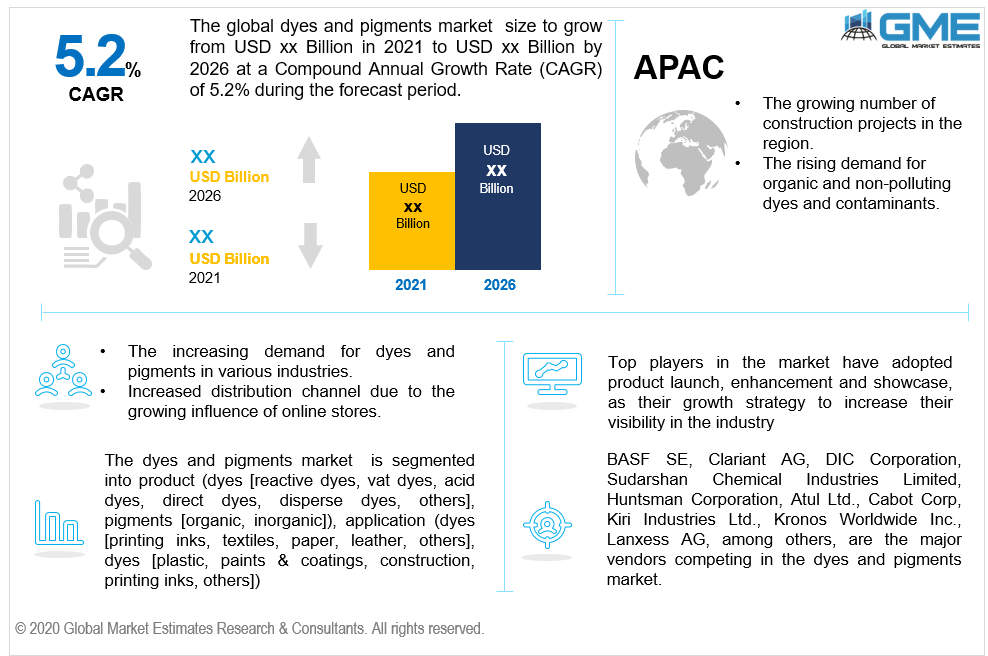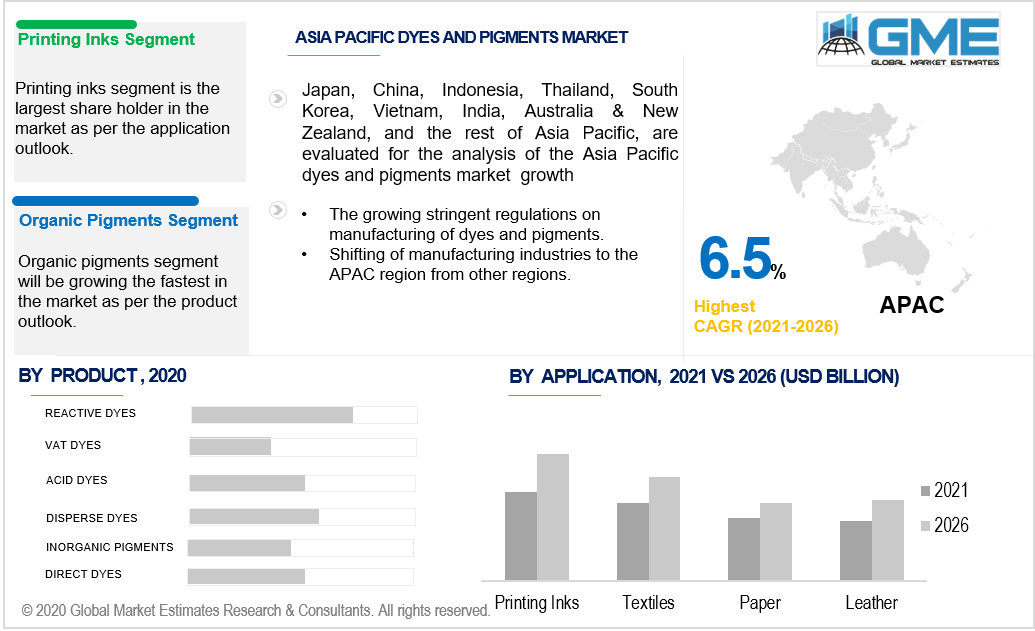
Global Dyes and Pigments Market Size, Trends, and Analysis - Forecast To 2026 By Product (Dyes [Reactive Dyes, Vat Dyes, Acid Dyes, Direct Dyes, Disperse Dyes, Others], Pigments [Organic, Inorganic]), By Application (Dyes [Printing Inks, Textiles, Paper, Leather, Others], Dyes [Plastic, Paints & Coatings, Construction, Printing Inks, Others]), By Region (North America, Asia Pacific, CSA, Europe, and the Middle East and Africa); End-User Landscape, Company Market Share Analysis & Competitor Analysis
Dyes and pigments are utilized to give a specific tone to the material. The significant difference in the molecule size among dyes and pigments separates these two products. Dyes are usually smaller in size compared to pigments. The smaller size of dyes reduces the ultraviolet light stability compared to pigments that are more ultraviolet stable. Dyes are also known as colorants are usually dissolved in liquids. The dye dissolved liquid is then absorbed by the material and thereby imparts a color to the material. Pigments are suspended within a liquid and the liquid forms bonds with the material’s surface and form a paint film. As dyes are not ultraviolet light stable, they can deteriorate and the color can fade under prolonged exposure to light. Pigments are highly ultraviolet resistant and thereby end up being more stable under constant exposure to light. As dyes are absorbed into the material, selective absorption of dyes gives the material the desires color. Pigments, on the other hand, impart color based on scattering of light or selective adsorption onto the material’s surface. Pigments generally last longer than dyes. Aesthetically pleasing visuals have always been vital to society. Visually pleasing features are always preferred by people, this has led manufacturers to produce aesthetically pleasing products. The growing demand for dyes and pigments in industries like textiles, paints, coatings, construction, and plastics is the major driver of the growing dyes and pigments market. There are growing concerns about the dyes and pigments used in various industries causing various environmental problems. Dyes and pigments manufacturers are beginning to implement new manufacturing technologies that reduce or remove the use of environmentally hazardous pollutants. Dyes and pigments have exploited the growing e-commerce market to improve their distribution channels. By selling dyes and pigments in both retail stores and online stores, the vendors have increased their consumer base which has also contributed to the growth of the dyes and pigments market. Growing population rates and rapid industrialization have increased the number of construction projects. Growing construction projects have increased the demand for pigments & dyes. As investments into construction increase, the demand for these products will also accelerate during the forecast period. The dyes and pigments market has been hampered by the environmental concerns arising from the usage of dyes and pigments. Textile industries require large amounts of water to rinse textiles, the used water is contaminated with dyes that have run off from the textiles. Dyes are also water-soluble which adds to the problem of pollution. Pigments have high metal content which leads to water pollution when these pigments enter water bodies. The manufacturers of dyes and pigments are hampered by the volatility of prices of raw materials like benzene.

Based on the product, the dyes and pigment market is segmented into dyes and pigments. Dyes are classified as reactive dyes, vat dyes, acid dyes, direct dyes, disperse dyes, and others. The pigments segment includes organic and inorganic pigments. Reactive dyes are expected to hold the dominant share of the dyes segment during the forecast period. Reactive dyes are resistive to color fading and have bright shades of color. In most of the textile industries, reactive dyes are the first choice. A covalent bond is formed between the reactive dyes and fibre during the process of dying. In the pigment segment, the inorganic pigments are expected to hold the dominant share of the market. Inorganic pigments have dark colors, good wetting, and leanness which are the factors that have led to the dominant share of the market. Organic pigments are expected to register the fastest growth rate among pigments segment during the forecast period.
According to various applications, the market is largely segmented as dyes and pigments. The dyes segment is further segmented into printing inks, textiles, papers, leather, and others. The pigment segment includes plastic, paints and coatings, construction, printing inks, and others. The printing inks segment of the dyes segment is expected to hold the dominant share of the market during the forecast period. Dyes are being extensively used in printing to attain the required color and intensity of color. Dyes give better color intensity, better resolution, and color enhancement compared to pigment-based inks. These advantages are the major factors for the large dominance of dyes in the printing industry.

The APAC region is expected to hold the dominant share of the market during the forecast period. Strict regulations placed on production facilities in Europe and North American have increased the number of dyes and pigments manufacturers in the APAC region. Production facilities are being shifted to countries like China and India which will increase the market share of this region. Europe is expected to register the fastest growth rate among all regions. The growing production capacity of Europe is expected to increase the share of the region. Dye and pigment manufacturers are implementing new technologies to reduce the usage of pollutants and produce novel organic dyes and pigments. Europe is a hotbed of technological innovations and the demand for technological advancements in the manufacturing of dyes and pigments will only contribute to the growth of the dyes and pigments market in the region.
Clariant AG, BASF SE, DIC Corporation, Huntsman Corporation, Lanxess AG, Sudarshan Chemical Industries Limited, Atul Ltd., Kiri Industries Ltd., Cabot Corp, Kronos Worldwide Inc., among others, are the major vendors competing in the dyes and pigments market.
Please note: This is not an exhaustive list of companies profiled in the report.
We value your investment and offer free customization with every report to fulfil your exact research needs.
The Global Dyes and Pigments Market has been studied from the year 2019 till 2026. However, the CAGR provided in the report is from the year 2021 to 2026. The research methodology involved three stages: Desk research, Primary research, and Analysis & Output from the entire research process.

The desk research involved a robust background study which meant referring to paid and unpaid databases to understand the market dynamics; mapping contracts from press releases; identifying the key players in the market, studying their product portfolio, competition level, annual reports/SEC filings & investor presentations; and learning the demand and supply-side analysis for the Dyes and Pigments Market.

The primary research activity included telephonic conversations with more than 50 tier 1 industry consultants, distributors, and end-use product manufacturers.

Finally, based on the above thorough research process, an in-depth analysis was carried out considering the following aspects: market attractiveness, current & future market trends, market share analysis, SWOT analysis of the company and customer analytics.

Tailor made solutions just for you
80% of our clients seek made-to-order reports. How do you want us to tailor yours?
OUR CLIENTS